Highlights
- Beware of friend requests from fake profiles mimicking real accounts.
- Exercise caution with phishing messages containing malicious links.
- Recognize and avoid romance scams seeking financial exploitation.
- Stay skeptical of lottery or prize scams demanding upfront fees.
Facebook is connecting billions across the globe but with its widespread use, is a double-edged sword, making it a prime target for scammers looking to exploit unsuspecting users.
Over the years, the sophistication of scams on Facebook has evolved, making it increasingly difficult to distinguish between genuine interactions and deceptive schemes.
Here’s an in-depth look at the top 10 Facebook scams, complete with tips on how to recognize them and strategies to protect yourself.
Friend Request from a Fake Profile

Scammers meticulously create fake profiles, sometimes cloning real accounts, to gain the trust of their victims.
These profiles often have minimal personal content and a low number of friends.
How to Avoid: Scrutinize profiles before accepting friend requests. Check for mutual friends and recent activity. A genuine profile usually has interactions with others over a period.
Phishing Messages
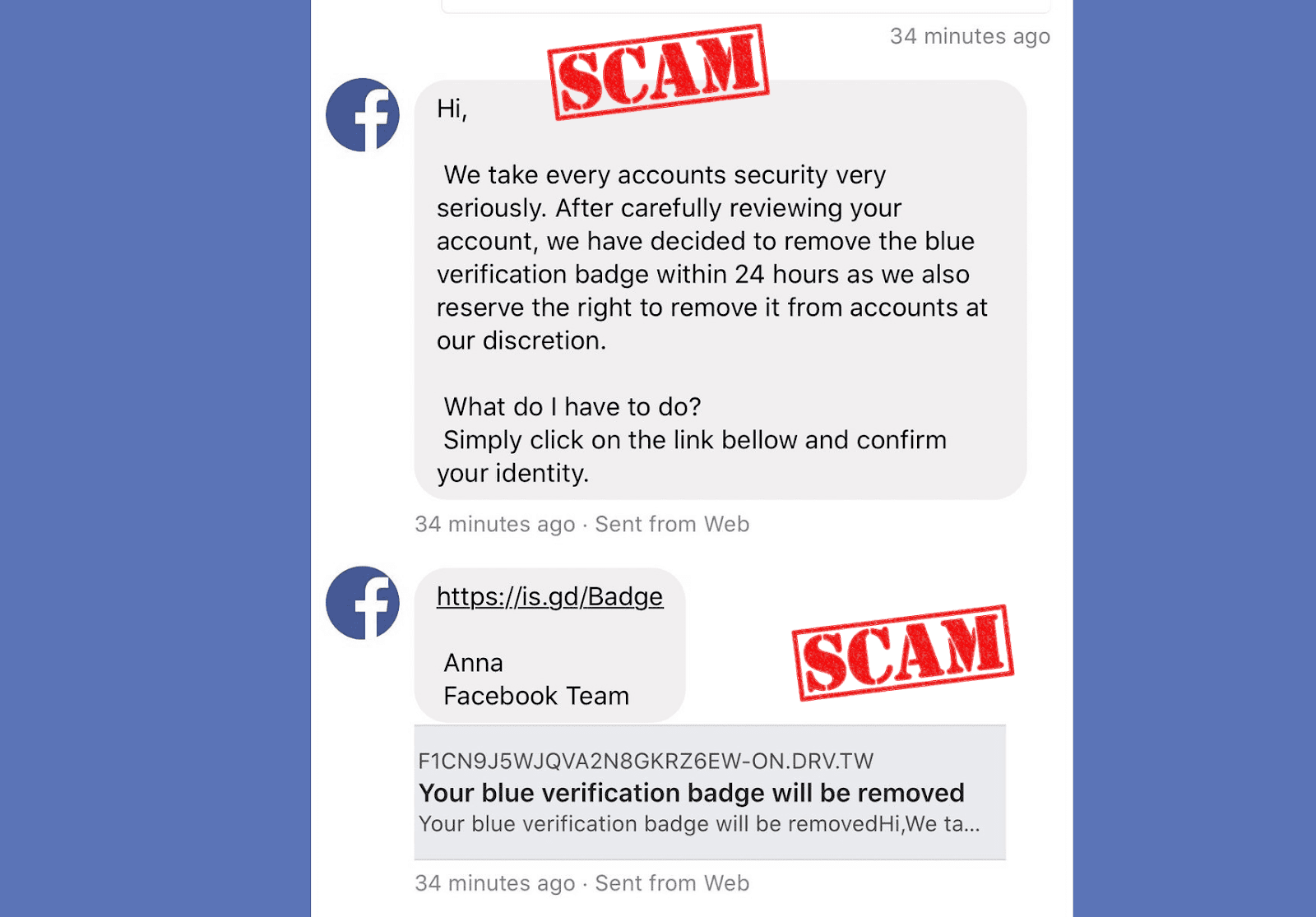
This scam involves messages that mimic those from friends or reputable entities, coaxing you to click on malicious links.
These links could lead to fake login pages designed to steal your credentials.
How to Avoid: Be cautious with unexpected links or requests, even from known contacts. Verify through other means if a message seems out of character.
Romance Scams

In a cruel twist on online dating, scammers use fake identities to build romantic relationships, ultimately manipulating victims into sending money or divulging personal information.
How to Avoid: Approach online relationships with caution. Never send money or share financial details with someone you’ve only met online.
Lottery or Prize Scams

These scams lure victims with messages claiming they’ve won a lottery or prize, asking for payment or personal details to “claim” the winnings.
How to Avoid: Be skeptical of unsolicited prize notifications. Genuine lotteries or contests do not ask winners to pay fees upfront.
Fake Charities
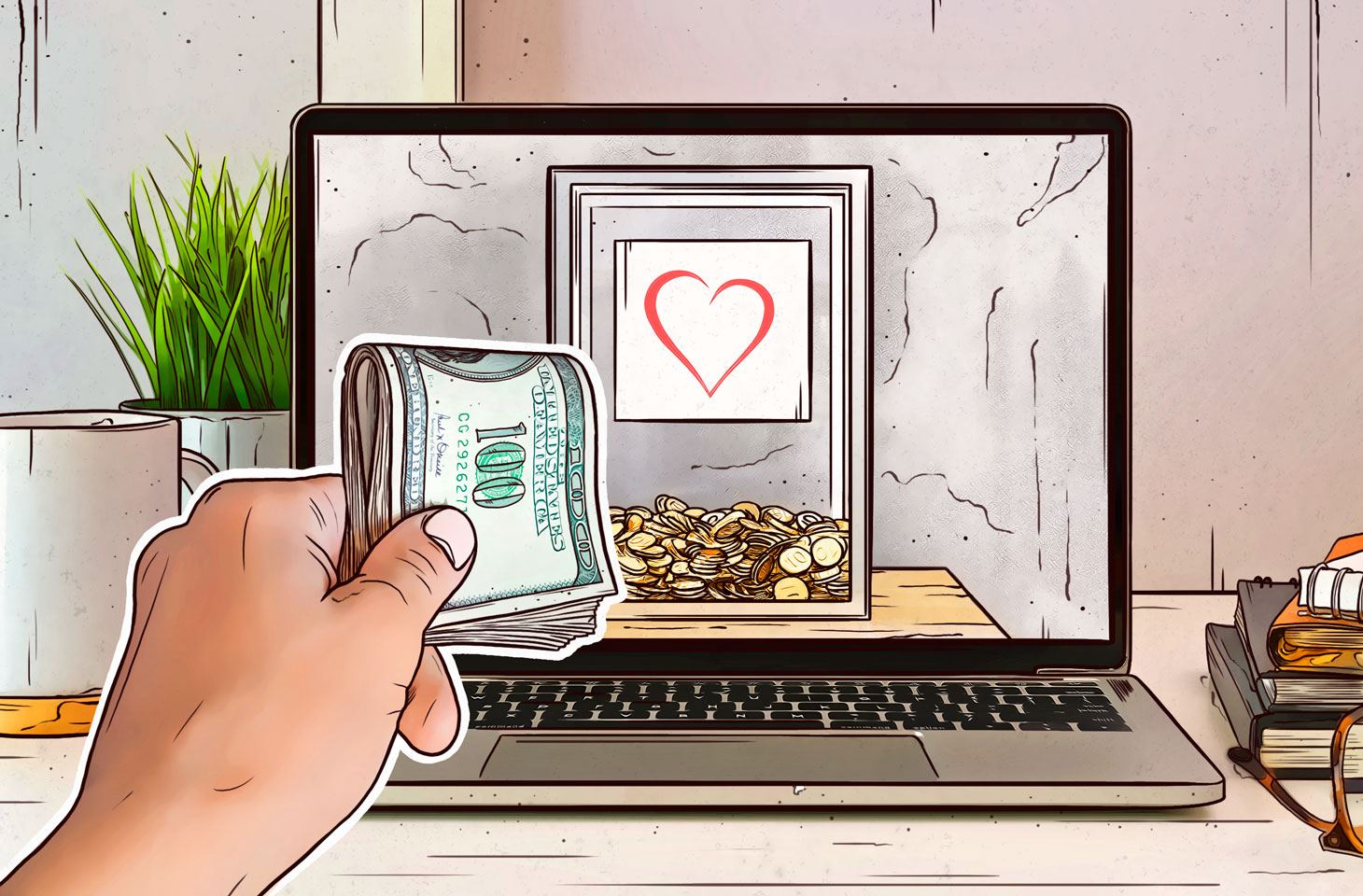
Exploiting the human instinct to help, these scams mimic legitimate charities, especially in the aftermath of disasters, to solicit donations that never reach those in need.
How to Avoid: Donate directly through reputable charity organizations’ official websites. Conduct research to ensure the charity’s legitimacy.
Marketplace Scams
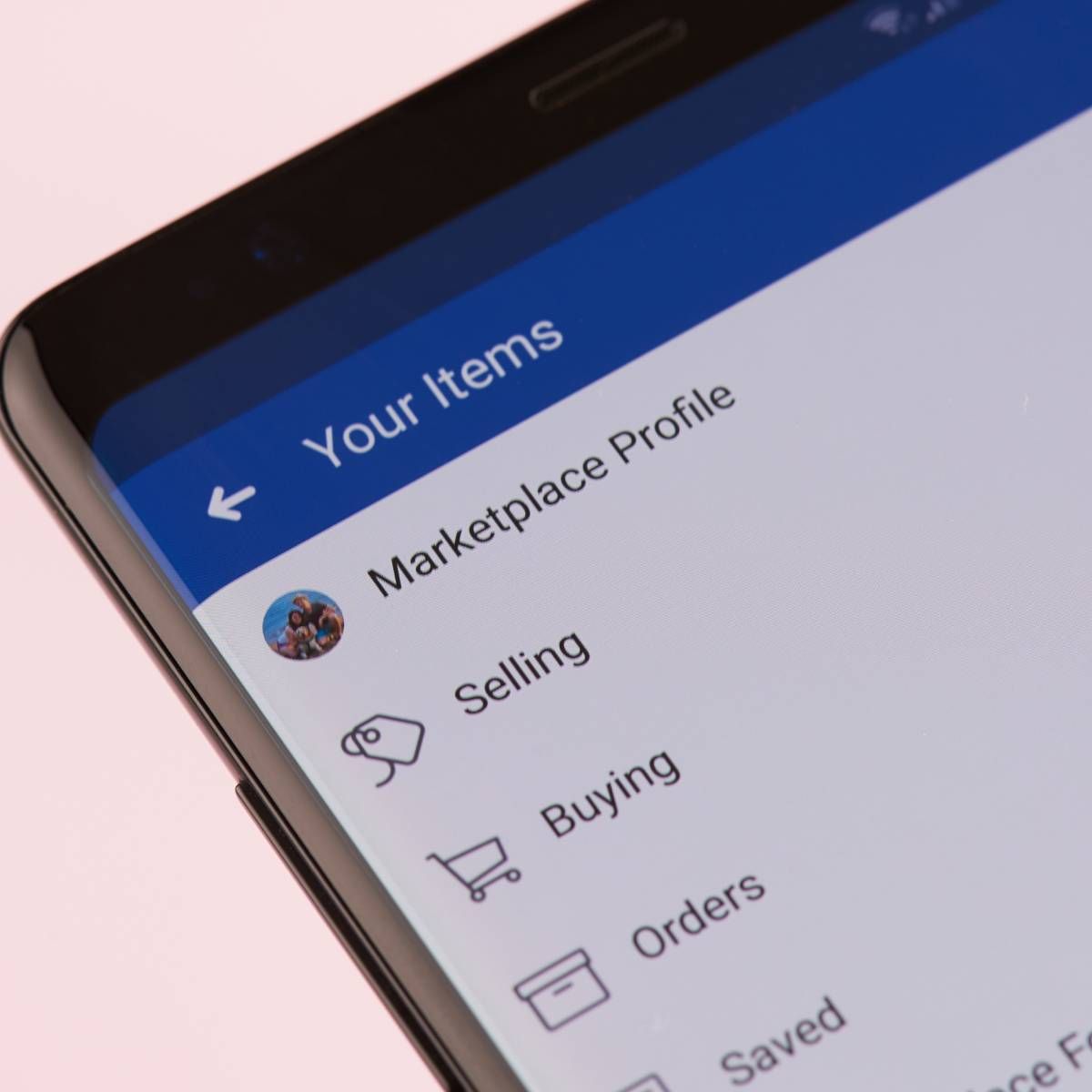
Facebook Marketplace has become a hotspot for scams, including non-delivery fraud and counterfeit goods.
How to Avoid: Use secure payment methods recommended by Facebook. Avoid transactions that ask you to use wire transfers or gift cards.
Investment Scams
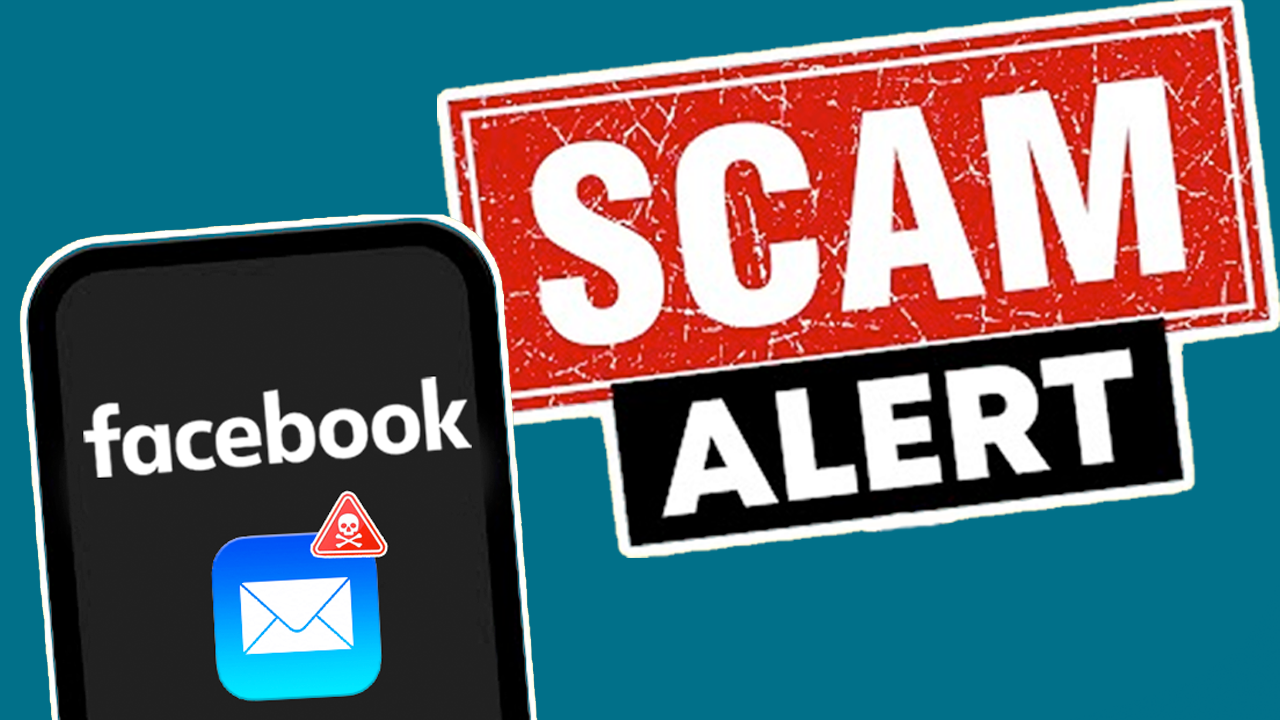
Promising high returns with little to no risk, these scams aim to entice users into fraudulent investment opportunities.
How to Avoid: Research any investment thoroughly. Consult with a financial advisor or check with regulatory bodies before investing.
Quizzes and Games

Seemingly harmless quizzes and games can be fronts for collecting personal data, which could be used for identity theft or sold to advertisers.
How to Avoid: Think carefully before providing personal information to third-party apps. Check the app’s permissions and privacy policy.
Impersonation of Friends or Family

Scammers may hack into or imitate the accounts of your friends or family, asking for money or personal information under the guise of emergency.
How to Avoid: Verify any urgent requests through a separate communication channel, especially if they involve money or sensitive information.
Job Offer Scams
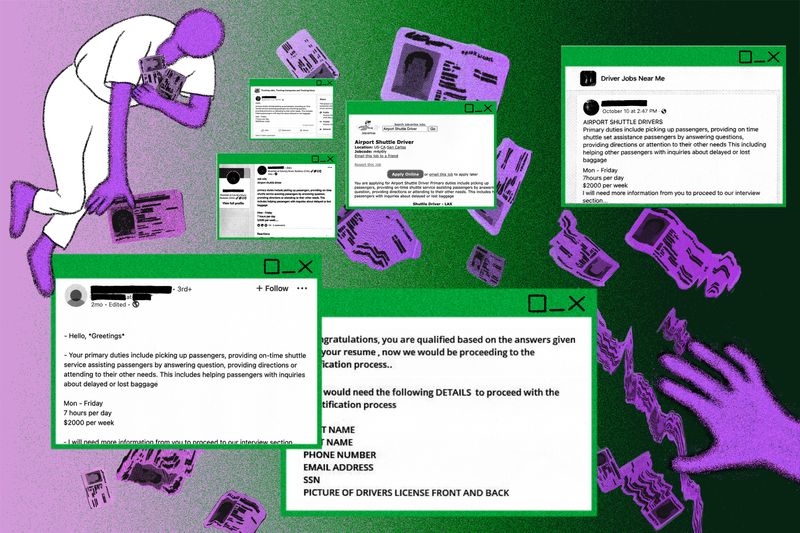
These scams prey on job seekers by offering fake job opportunities that require payment or personal information to “apply.”
How to Avoid: Be wary of job offers that require you to pay upfront. Verify the legitimacy of the company through official channels.
Enhanced Strategies for Facebook Safety

- Update Your Privacy Settings Regularly: Limit what strangers can see and who can contact you.
- Enable Two-Factor Authentication: This adds an extra layer of security to your account.
- Educate Yourself and Others: Stay informed about common scams and share this knowledge with friends and family.
- Report Suspicious Activity: Use Facebook’s reporting features to flag suspicious profiles, messages, or posts.
- Use Strong, Unique Passwords: And change them regularly to prevent unauthorized access to your account.
FAQs
How can I identify a fake profile on Facebook?
Fake profiles often have few personal posts, a low number of friends, and might mimic real accounts. Always check for mutual friends and consistent interaction history before accepting friend requests.
What should I do if I receive a suspicious link in a message?
Avoid clicking on unexpected links, even from known contacts. Verify the message’s authenticity by contacting the sender through a different communication method if the message seems unusual.
How can romance scams be prevented on Facebook?
Be cautious in online relationships, especially with individuals you’ve never met in person. Never send money or share personal financial information with online acquaintances.
Are there signs to recognize a lottery or prize scam?
Legitimate contests or lotteries do not require winners to pay fees to claim prizes. Treat any messages claiming otherwise with skepticism and do not provide personal information or payment.
What precautions should be taken when using Facebook Marketplace?
For safe transactions, use Facebook-recommended payment methods and avoid deals that sound too good to be true. Prefer local, in-person exchanges in public places when possible.
What to Do if You Connected with a Scammer ?
If you fear you may have accepted a friend request from a scammer, take these steps:
Review your mutual friends in common. Contact any connections listed to verify if they actually know this person. If not, they are likely fake.
Look for recent posts or conversations with the account. Scammers often have few posts or generic comments if any at all.
Check when the account was created. Fake accounts are often new, having been created recently.
Observe the account activity going forward. If you see suspicious posts or messages, that’s a red flag.
Report the account if you confirm it’s fake. Block them to prevent future contact.
Change your privacy settings to limit what friends of friends can access. This prevents scammers from exploiting mutuals.
Monitor your accounts closely for any suspicious activity going forward and report it immediately. Enabling Two-Factor Authentication adds an extra layer of security as well.
Warn your friends and connections about the scam to prevent the scammer from targeting more people. Share any details to help them recognize fake requests.
Staying vigilant when accepting new friend requests can help avoid letting scammers gain access. If you do connect with one, take swift action to report, block and mitigate the damage done.
What to Do if You Connect with a Like-Farming Page?
If you engaged with a Facebook page you now believe to be a like-farming scam, here are some precautions to take:
Unlike and unfollow the page to stop supporting their manipulative tactics.
Report the page to Facebook detailing how they misled users. This can help get scam pages shut down.
Block the page from your account to prevent any future contact.
Check your account settings. Limit what information the general public can see to prevent details from falling into the wrong hands.
Beware of any external sites the page led you to visit. Avoid entering any sensitive information to steer clear of further scams.
Use security and privacy Facebook settings to manage who can see your activity and connections going forward.
Enable Two-Factor Authentication as an extra login security measure.
Staying wary of giveaways and prizes promoted on Facebook that seem too good to be true can help you recognize and avoid like-farming scams. Report any suspicious pages to keep other users from falling victim.
What to Do if You Shared Fake News?
If you shared an article on Facebook you later realized was fake or a hoax, here are some important steps to take:
Delete your post sharing the fake content. This helps stop its spread.
Comment on your post to clarify the content is fake before deleting it. This notifies your connections.
Report the fake news article to Facebook. This can help suppress its reach.
Check your privacy settings. Limit old posts being visible to prevent spreading debunked information.
When in doubt about suspicious news, look for trusted fact-checking sites to verify stories before sharing them.
Consider issuing a new post apologizing for spreading fake news and encouraging smarter sharing. We all make mistakes.
Learn to identify warning signs of fake news, like sensationalized headlines, dubious sources, and lack of author details.
Staying proactive by identifying and admitting mistakes can be empowering. We all fall for fake news sometimes, but collectively combating misinformation can make a real difference.
What to Do if You Donated to a Scam Fundraiser?
If you donated to what you now believe was a fake Facebook fundraiser, here are some important actions to take:
Report the fundraiser to Facebook as a scam and include details on how they misled you. This can get fraudulent fundraisers shut down.
Contact your bank and challenge the charges if you donated by debit/credit card. Report it as fraudulent.
Spread awareness to friends to reinforce the importance of verifying fundraisers before donating. Share your experience to prevent others being tricked too.
Look up the name image of anyone depicted to see if the photos are actually stock images of models. Reverse image searches can help expose this.
When in doubt, seek out the individuals or organizations campaigning for donations on other platforms to confirm identities.
For tax purposes, save any receipts or confirmation emails for donations you later learn were fraudulent.
How to keep yourself safe from Bogus job scams?
Be wary of people claiming you got a dream job without even having to interview. Before submitting your personal information to places of employment, make sure it’s a legitimate company.
How to keep yourself safe from Fake notifications ?
Don’t click on any links from unknown sources. If you get a notification about your page’s security, but it’s actually a message in your page’s inbox, ignore it and report the sender to Facebook.
Moreover, to enhance your online protection and protect your device from malware, we recommend getting NordVPN. Any link you click on will be scanned with NordVPN’s malware protection software, instantly blocking any harmful programs from infecting your device.
How to keep yourself safe from loan scams?
If you need a loan, make sure you only apply to licensed financial services providers. If an interest rate sounds too low to be true, it’s probably a scam.
How to keep yourself safe from Fraudulent surveys ?
Don’t fill out surveys that make unrealistic promises, ask you to share them, or ask for too much personal information. If you do fill out surveys, make sure the website you’re on is a reputable survey provider to protect yourself from identity theft.
What is Secret Santa scam on Facebook ?
The holiday spirit is beautiful, and organizing a Secret Santa with your coworkers is always fun. But be very reticent when you get the same offer over Facebook.
Scammers will pretend they’re organizing a massive Secret Santa worldwide, and all you have to do is send this random person a gift card or some such low-value gift. In exchange, you’re promised dozens of gifts from other jolly fellows like yourself.
Of course, this “random” person is none other than the scammer. Like most Ponzi schemes, the first few people who join may actually receive a gift to build credibility. But most people won’t see anything in return for their gift, all while the scammer is raking in dozens of free gift cards and wine bottles.
Things you can do outside of Facebook to protect yourself from scam ?
-Keep your device’s operating system updated
-Install antivirus software on all your devices
-Report all suspicious emails
-Be skeptical and vigilant whenever you interact on Facebook by using your common sense
-A VPN (virtual private network) is another layer of protection against cybercriminals because it hides your IP address
What are ways cybercriminals can hurt you?
Infecting your devices and spreading malware to your contacts
Racking up credit card charges
Draining your bank account
Ruining your credit
Stealing your identity
How do I report a Facebook scam?
Facebook makes it easy to report a suspected scam post, account, page, or direct message. There is always a Report option available on every Facebook screen. To access it, you’ll most often need to click on the three dots next to a profile name, message, or post.
Just click on the Report option, follow any additional prompts, and Facebook will investigate your scam claim.
Also Read: How to Lock Your Facebook Profile from Strangers via Android mobile phone, iPhone and Desktop?
Also Read: Changing Your Name on Facebook: A Comprehensive Guide for Android, Desktop, and iOS Devices
Also Read: Mumbai Man Cheated of Rs 90,000 in Online Loan Scam Originating from Facebook Ad
